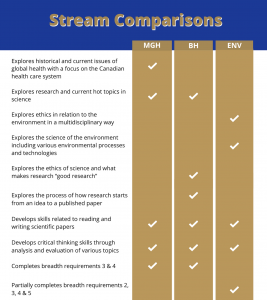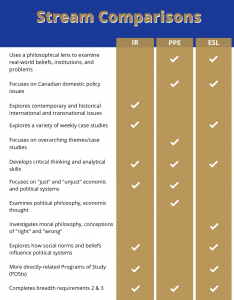Frequently Asked Questions
Questions about your Trinity One application
No. The Trinity One application is normally available in early February. You can apply to the Trinity One Program prior to receiving an offer of admission from the University of Toronto. We actually recommend submitting your application prior to the final deadline as applications will be assessed in rounds. As soon as you are admitted by the Faculty of Arts & Science we can process your application to the Trinity One Program. Some streams fill up quicker than others, so it is recommended you complete your application earlier.
No. Any first-year incoming student who has applied to the Faculty of Arts & Science on the St. George campus is eligible to apply to Trinity One, regardless of college membership. To learn more about the colleges, click here.
Yes. In fact, when you apply you will be asked to indicate your interest for all Trinity One streams. To maximize your chances of being admitted to the program we recommend indicating your preference in multiple streams. If you indicate preference in multiple streams, however, ensure that you keep your top stream as your highest preference.
Although Trinity One has three rounds of admission, spaces can fill up quickly. We encourage you to apply early to have the best chance.
There are other First-Year Foundation Programs at the other colleges at the University of Toronto. You are allowed to apply to as many of the Ones Programs as you wish (offered by the colleges and the Munk School), but can only accept one offer. Please note: If you receive an offer from the Trinity One Program after you’ve accepted an offer from another Ones Program, you can still accept your Trinity One offer. All you need to do is decline your original offer by contacting the program office of the other Ones program. You are also eligible to take other seminar courses, provided they do not list Trinity One as an exclusion.
Admission to Trinity One is based on your academic performance as well as your Trinity One application, which includes both a video and essay component. We encourage applicants from diverse learning experiences and those from historical and current underrepresented populations to apply.
No. Admission into the Trinity One program requires a separate application. Once you apply to Trinity One and a decisions has been made, you will receive an email from the Trinity One program.
No. You must follow the instructions on your Trinity One program offer sent to your email to accept your spot in the Trinity One program.
No. Enrollment in Trinity One courses is included in the fees you pay to the University.
Questions about Trinity One and first year
No. You are not able to take only one course or mix and match between streams. Each stream has two courses that students are required to enrol in.
No. You are not able to switch streams once you have accepted your offer.
No. The two courses that make up each Trinity One stream are intended to give you different approaches to thematically-related yet distinct literatures. So there will be overlap between the kinds of issues you discuss in each course, but there will also be fairly significant methodological differences. This is part of the interdisciplinary design of Trinity One. By the end of the year you will have developed skills that will be relevant to a range of programs of study.
Unlike a traditional lecture class where the instructor delivers a lecture and students take notes, Trinity One seminars involve learning through discussion. Instructors teach the material by asking guiding questions that bring the key ideas to the forefront. As such, student participation takes up most of class time and is one of the main areas of assessment alongside essays and oral presentations. All students are expected to contribute to the class discussion. The courses are designed to help shyer students gain comfort and confidence expressing their ideas.
No and Yes. No, in that Trinity One courses are not marked any harder than normal first year courses. Yes, in that most of your other first-year courses will be in a format to which you are already accustomed. Trinity One courses are seminars where students are expected to have read and thought about the issues and arguments in the assigned readings, and are prepared to debate those ideas with others. This will present new challenges that may take a little while to get used to. Since all of Trinity One’s first-year courses are year-long seminars, there will be plenty of time to make any needed adjustments.
Trinity One offers not only academic growth in your classes but outside of the classroom as well. Students participate in co-curricular lunches that occur most Tuesdays from noon – 2 PM. Students can expect professional skills workshops, guest speakers and socials during this time. In addition, Trinity One students are able to receive one-on-one support by faculty, mentors and many other support staff here at the college!
Questions about second year and beyond
Trinity One allows for improvement in a variety of skills, including critical thinking, academic reading and writing, and analytical frameworks, in a variety of disciplines, which are essential for upper years. The small seminar environment provides students with a unique learning experience that they may not encounter again until 400-level seminar courses. It also provides access to a variety of co-curricular talks, academic skills workshops, and advising sessions.
No. Any student can apply to the International Relations or Ethics, Society & Law major after completing at least one year of study in the Faculty of Arts & Science (minimum 4.0 credits). However, Trinity One provides an excellent foundation for the upper year courses students are required to take as part of these majors. In addition, Trinity One courses satisfy both admission and degree requirements for both programs. For more information, please visit the Faculty of Arts & Science Academic Calendar.
Yes. There are a number of opportunities for alumni who are current undergraduate students and alumni who have graduated to stay connected to the program. As our alumni population expands, current undergraduate students may serve as mentors, research assistants and work study students for the program. Alumni who have graduated may return to the program to share how Trinity One has impacted their overall experience.
Yes. Trinity College offers research and experiential learning courses that can build upon research projects undertaken in Trinity One. For more information on these opportunities please visit the sites below for more information:
Trinity Comprehensive Paper (TRN377Y and TRN477H)
Trinity College International Experience (TRN307H and TRN308H)
Scientific Writing for Non-Scientific Audiences (TRN478H)
Research Opportunity Program (TRN299Y and TRN399Y)
Trinity College Independent Studies Program
Contact Us:
Sharon Reid
Margaret MacMillan Trinity One Program Coordinator (Acting)
trinityone@trinity.utoronto.ca




